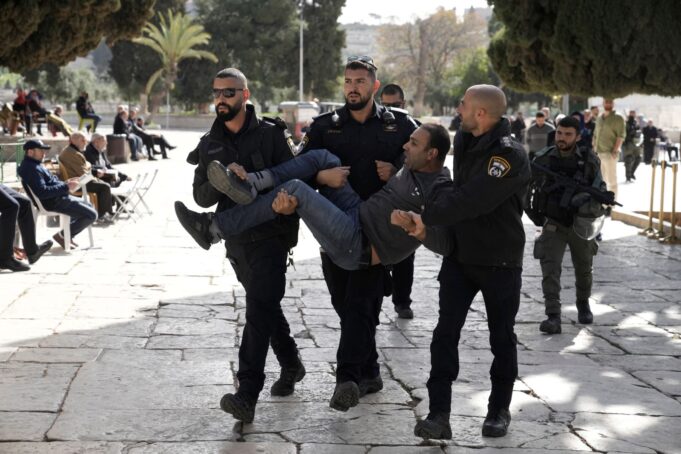Israeli officers beat worshipers at the Al-Aqsa Mosque, Islam’s third holiest site, with batons and butts of riot guns, wounding many before arresting them, handcuffing over 400, and carting them off to jail. Their crime, reported Portside. org, was simply making Taraweeh prayers (night prayers) made during the holy month of Ramadan.
Na’eem Jeenah is a senior researcher at the Mapungubwe Institute for Strategic Reflection based in South Africa and is the former executive director of the Afro-Middle East Center. Jeenah told Africa Watch that such oppressive tactics under Israel’s apartheid regime are par for the course.

In a recent article, Jeenah noted that apartheid to a South African is much more personal, emotional, and relatable than international law might suggest. “For us, apartheid was (and is) a systematic, institutionalized way in which people are discriminated against on the basis of their ‘race’ or ethnicity, and where rights and privileges accrue to people on the basis of their ‘race’ or ethnicity,” he wrote. “In South Africa, that meant that Whites were privileged over Blacks; in the Palestinian and Israeli context, it means that Jews are privileged over non-Jews. Israel’s policies constitute apartheid both in the OPT (Occupied Palestinian Territory) and within Israel itself.”
During his interview with Africa Watch, Jeenah highlighted to this writer the similarities between South African apartheid and what Human Rights Watch refers to as Israel’s system of apartheid, including, systematic oppression by the “dominant racial group over the marginalized group” and “inhumane acts” being committed.
Jeenah said, under the apartheid system he grew up under, “the grand apartheid was the idea that you could create little enclaves that the South African government referred to as independent homelands, which we referred to as Bantustans.” These enclaves and citizenship of all (Black) South Africans would then be transferred to these new political entities, he explained. Add to that, said Jeenah, “You were no longer a South African citizen, you were a citizen of one of those Bantustans, so therefore you had no rights in South Africa as a citizen.”
Under this grand plan of apartheid, every African linguistic group had their “own little homeland, which is not as great as it sounds, because these were usually the parts of the country that were the most barren, least productive. Their main purpose was as reserve pools of labor for South African industry,” noted Jeenah.
And though you may have never lived in one of these 10 socalled homelands you were regarded as a citizen. And when you ceased to be productive workers “you would just be dumped in your assigned Bantustan,” he continued. “Their post-production period and looking after them was no longer the responsibility of the South African State. It became the responsibility of another so-called government.”
In the Palestinian case there is a different dynamic,” said Jeenah. He was previously invited by the South African Consulate to do research in Israel but was detained and held incommunicado by security police at Ben Gurion Airport in Tel Aviv before being put on a plane and deported. “The attempt is in fact firstly, to cut off any relationship between citizens of Israeli Palestinians who live in the Occupied Territory and to completely get rid of any kind of dependence of Israeli industry on Palestinians as workers. The ultimate goal is to rid Israel of all Palestinians,” he said .
“The whole project in the occupied territory is occupation, apartheid, and colonialism in order in the long term to perpetrate a genocide.”
Within Israel, 20 percent or one-fifth of the Israeli population is Palestinian, yet Israel passed a “Nation-State Law” which referred to Israel as a Jewish State—a state reserved for Jews.
“So even those Palestinians within Israel, the equivalent in the South African context would be those who would be classified as Indians and coloreds. There was no separate homeland for those classified as Indians and coloreds. They were an inconvenient reality within … the White state. So, they had to be accommodated in some kind of way,” said Jeenah. Since they were citizens the parliament was structured to include a chamber for the “so-called coloreds” and another chamber for the “so-called Indians.”
One would think that would be the equivalent of the Palestinians of Israel. But South Africa never declared itself as a state for White people. Israel has declared itself as a state for Jews. And that means even for Palestinians who are citizens of Israel, and Palestinians whose ancestry dates back maybe thousands of years, even though they are regarded as citizens they are not regarded as nationals.
“In any normal country citizenship and nationality are pretty much one and the same. If a person has citizenship, they also have nationality but not in the Israeli context. In Israel, all those who live within Israel can be citizens, but nationals of Israel are those who are Jews, no matter where in the world they live.”
According to “The Law of Return,” passed in 1950, Jews anywhere in the world, even if they’ve never lived in Israel, can “relocate” to Israel and claim Israeli citizenship. In terms of dual citizenship, Jews can migrate to Israel without losing their previous national status.
Follow @JehronMuhammad on Twitter













